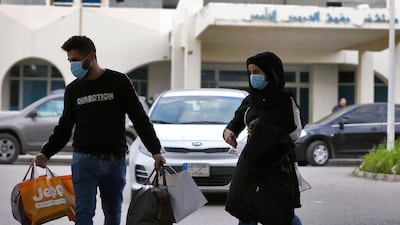Iran reported two more deaths from the coronavirus raising concern from the World Health Organisation (WHO).
The deaths raise the number of fatalities to four with 14 other confirmed cases, the Iranian health ministry told the Mehr news agency.
The surge in coronavirus cases and deaths in Iran is "very worrisome" because the outbreak can’t be traced directly back to China, the head of the WHO said.
The cases suggest rapid spread in a country outside of the epidemic’s centre in China, WHO Director-General Tedros Adhanom Ghebreyesus told reporters on Friday.
The window of opportunity to stop the spread in countries outside the place where it began is “really narrowing,” he said.
“This outbreak could go in any direction.”
Meanwhile, Lebanon reported its first case on Friday, the UAE reported two further cases and Iraq and Kuwait took measures to prevent outbreaks.
Outside of the Middle East, the number of people in Italy infected with the new virus more than quadrupled on Friday to 17.
Kianoush Jahanpour, the Iranian healthy ministry spokesman said the new cases in Iran are all linked with city of Qom where the first two elderly patients died on Wednesday. He said the new cases were either from Qom or had visited the city recently. Four of them are in hospital in the capital, Tehran, and two in northern province of Gilan.
Minoo Mohraz, an Iranian health ministry official, said the coronavirus “possibly came from Chinese workers who live in Qom and travelled to China.” She did not elaborate, though a Chinese company has been building a solar power plant in the city.
Concerns over the spread of the virus, which originated in central China, prompted authorities in Iran this week to close all schools and Shiite seminaries in the city, about 130 kilometres south of Tehran.
Qom is a popular religious and scholarly centre for Shiites inside Iran, as well as Iraq, Pakistan and Afghanistan and Azerbaijan. It is also known for its cattle farms.

Tehran once relied heavily on China to buy its oil and some Chinese companies have continued doing business with Iran in the face of US sanctions. Unlike other countries — such as Saudi Arabia, which barred its citizens and residents from traveling to China — Iran has not imposed such measures. But it has suspended all passenger flights with China for the past two weeks, allowing only cargo flights.
Iran's civil aviation spokesman Reza Jafarzadeh said on Thursday that the "cargo flights, if necessary, are under supervision, and controls imposed by the health ministry are carried out".
The new virus emerged in China in December. Since then, more than 76,000 people have been infected globally, in as many as 27 countries, with more than 2,200 deaths being reported, mostly in China.
There have been few virus cases in the Middle East so far. Nine cases have been confirmed in the UAE and one case each in Egypt and Lebanon. Of the nine in the UAE, seven are Chinese nationals, one is a Filipino and another an Indian national.
Sistani urges coronavirus preparation
Ayatollah Ali Sistani, Iraq's senior Shiite religious leader on Friday called on authorities to be ready to stem any outbreak.
"The scale of preparations should match that of the threat," he said in his weekly sermon delivered by a representative.
"We call on relevant authorities to be up to the level of responsibility."
The coronvirus outbreak has triggered unprecedented measures taken between Baghdad and Tehran.
Iraq on Thursday clamped down on travel to and from the Islamic republic, with Iraq's health ministry announcing people in Iran were barred from entering the country "until further notice".
"Iranians are prohibited from entering [Iraq]," a senior official told AFP, adding that border crossings with Iran had been closed, with only returning Iraqis allowed to pass through.
Those Iraqis would be examined and, if necessary, placed in quarantine for 14 days, the health ministry said. Iraqi nationals are also not allowed to travel to Iran.
The border closure followed a backlash against a Wednesday announcement of visa waivers for Iranian nationals wishing to travel to Iraq. Iraqis took to social media using the hashtag "close the border" and local officials called for a ban on the entry of goods and people.
Airports were already screening travellers for the virus and national carrier Iraqi Airways has suspended flights to Iran. Baghdad had previously issued a ban on the entry of Chinese nationals.
Lebanon confirms first coronavirus case
Lebanon’s health ministry has confirmed a woman has tested positive for coronavirus, with two other suspected cases being investigated.
The 45-year-old Lebanese woman had been in Qom, health minister Hassan Hamad said on Friday.
"We confirmed the first case today," Mr Hamad said, adding that the woman was in good health.
Mr Hamad said that all the people who were on the same flight from Iran had been contacted by the health authorities.
He added that anyone returning from Iran would be asked to observe a two-week home quarantine.
Kuwait stops all Iran flights
Kuwait’s civil aviation authority decided on Friday to stop all flights to and from Iran amid fears over the coronavirus outbreak, the state news agency said, citing a statement from the authority.
The authority also decided to ban residents or those with entry permission who were in Iran during the past two weeks adding that any Kuwaiti national arriving from Iran will be directed to isolation. Moreover, it has been decided to ban entry for travellers coming from Iran.
The statement that comes in accordance with the Kuwaiti health ministry instructions, called citizens not to travel to Iran for the time being.










